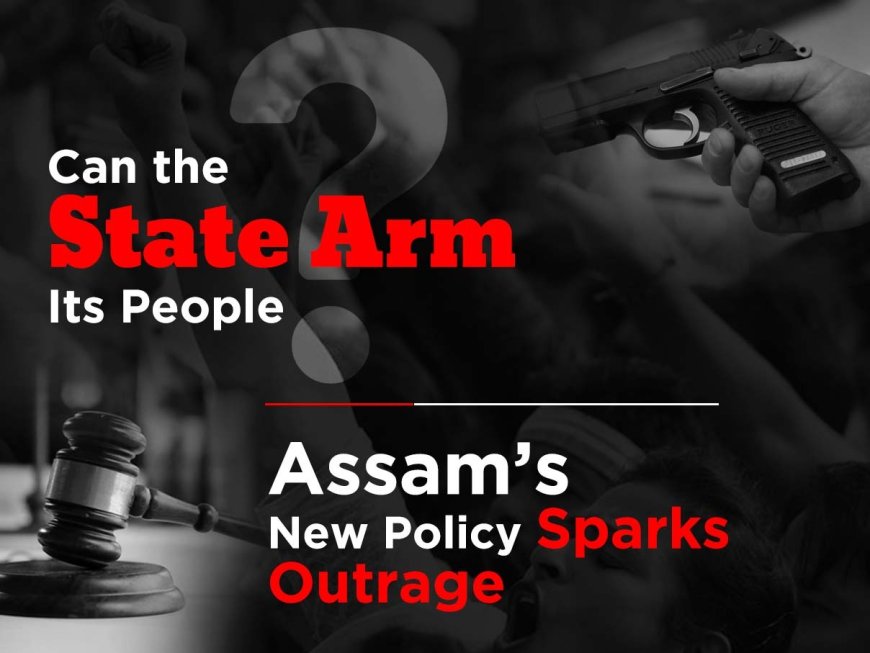Can the State Arm Its People? Assam’s New Policy Sparks Outrage
The policy has also rekindled memories of the Salwa Judum movement in Chhattisgarh, where civilian groups were armed to fight Maoist insurgents in the mid-2000s. The outcome was catastrophic: rampant human rights violations, extra-judicial killings, and deepened internal conflicts. In 2011, the Supreme Court declared the Salwa Judum unconstitutional, noting that arming civilians is a violation of human rights and a failure of the state to maintain law and order through legitimate means.

In a controversial move that has drawn strong criticism from civil society and political opposition alike, the Bharatiya Janata Party-led Assam government has approved a special scheme to issue arms licenses to “eligible” indigenous residents in remote and vulnerable border areas of the state. The stated objective: to deter threats and bolster community confidence in areas bordering Bangladesh.
However, this decision marks a troubling shift from the foundational principle of the state’s monopoly over violence — a cornerstone of any modern democracy governed by the rule of law. Chief Minister Himanta Biswa Sarma, defending the policy, claims that the initiative empowers vulnerable communities to protect themselves where law enforcement presence is minimal. Yet, this justification opens up deeper concerns over legality, precedent, and the potential consequences of weaponising civilian groups.
The Legal Grey Area
India’s Arms Act, 1959 and Arms Rules, 2016 regulate civilian access to weapons under a stringent licensing framework. Licenses are typically issued on a case-by-case basis for individual self-defence, and the law does not support the blanket arming of larger, socially or ethnically defined groups. This is because such classifications can be fraught with communal tension, operational challenges in monitoring, and potential misuse.
From an administrative lens, group-based licensing not only deviates from legal norms but also risks contravening Articles 14 and 21 of the Constitution, which guarantee equality before the law and protection of life and liberty, respectively. When access to arms is granted to one group while others remain excluded, it creates an uneven and potentially dangerous power dynamic.
Echoes of the Past: The Salwa Judum Precedent
The policy has also rekindled memories of the Salwa Judum movement in Chhattisgarh, where civilian groups were armed to fight Maoist insurgents in the mid-2000s. The outcome was catastrophic: rampant human rights violations, extra-judicial killings, and deepened internal conflicts. In 2011, the Supreme Court declared the Salwa Judum unconstitutional, noting that arming civilians is a violation of human rights and a failure of the state to maintain law and order through legitimate means.
Assam, with its complex history of insurgency — particularly involving groups like the ULFA (Independent) — is especially vulnerable to the escalation of violence if more arms are introduced into civilian hands.
Political Backlash and Fears of Misuse
Assam Congress President and Lok Sabha MP Gaurav Gogoi has condemned the move as “highly dangerous,” accusing the BJP of prioritising weapons over essential public services. “People of Assam want water, employment, education, and medical facilities, not guns,” Gogoi told the press. He also warned that the arms scheme could be manipulated to arm BJP and RSS-aligned workers, posing grave threats to honest citizens and increasing the risk of fake encounters, especially after recent Supreme Court rebukes over alleged police excesses in the state.
Arms as a Substitute for Governance?
While the Assam government claims the policy is restricted to vulnerable border regions and excludes inter-state borders, the larger concern remains: Is the state abdicating its duty to uphold law and order by outsourcing security to civilians?
Instead of placing more weapons in the hands of private individuals, the state could strengthen local policing, deploy border-specific security personnel, and invest in early-warning surveillance systems. These strategies not only conform with democratic norms but also avoid the pitfalls of vigilante justice and inter-community clashes.
A Distracting Development Agenda
Interestingly, the arms policy was part of a larger Cabinet announcement that also approved a ₹250 crore partnership with Tata Technologies to convert 77 government ITIs and polytechnics into Centres of Excellence — a much-needed investment in skills and employment. The Cabinet also greenlit the renaming of several state institutions to honour Assam’s icons, including the rechristening of the Sarusajai Sports Complex as Arjun Bhogeswar Baruah Sports Complex.
For more factual, legal, and civic storytelling, follow us on Instagram @Verdicto_News







